Foreign Affairs at 100: A Look Back at the First Issue
Foreign Affairs is the premier long-form American magazine of international relations and will celebrate its 100th anniversary in September 2022. As an avid reader of Foreign Affairs, I thought it would be interesting to dive into the first issue from September 1922 and compare it to the present.
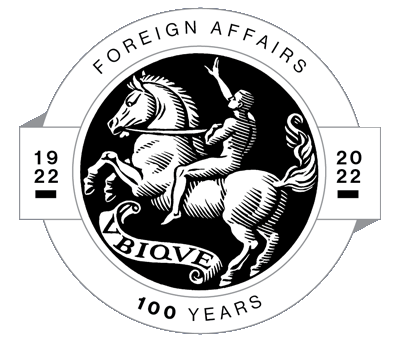
Reading a past issue of a magazine strongly situated in its time is a strange experience, roughly comparable to today watching an episode of Jon Stewart-era Daily Show or past SNL presidential debate spoofs. On the one hand, points and punch lines often miss the mark because much of the assumed cultural knowledge has since faded away. On the other, the reader gains a sort of omniscience from being able to discover how matters play out with just a few clicks.
As for organization, I offer some overall thoughts on the issue and how Foreign Affairs has changed between then and now. Next, I survey each of the twelve articles from the September 1922 issue. These articles are currently available to the public to read through JSTOR.
Overall Thoughts
Comparing the first issue to recent issues, surprisingly little has changed. The magazine largely retains the same structure: several long-form articles, detailed book reviews, followed by listings of new books of interest arranged by topic. The only structural difference with the first issue is the lack of a featured topic (which wouldn’t come about until much later).
The most glaring difference is with the intended audience for many of the 1922 articles. While today the magazine enjoys a wide international readership and is often written by authors affiliated with American or international institutions, several articles in the initial issue directly addressed the American people yet were written by foreign diplomats and public figures. For instance, in The Policy of France, the author seeks to convince the American political class that France is caught in a pickle rather than being blind aggressors in post-war diplomacy. Outside of articles of this sort, we find the usual mix of briefings and policy proposals that fill today’s pages.
One notable absence in these articles is the language of international relations theory and macroeconomics which were each in their relative infancy at the time!
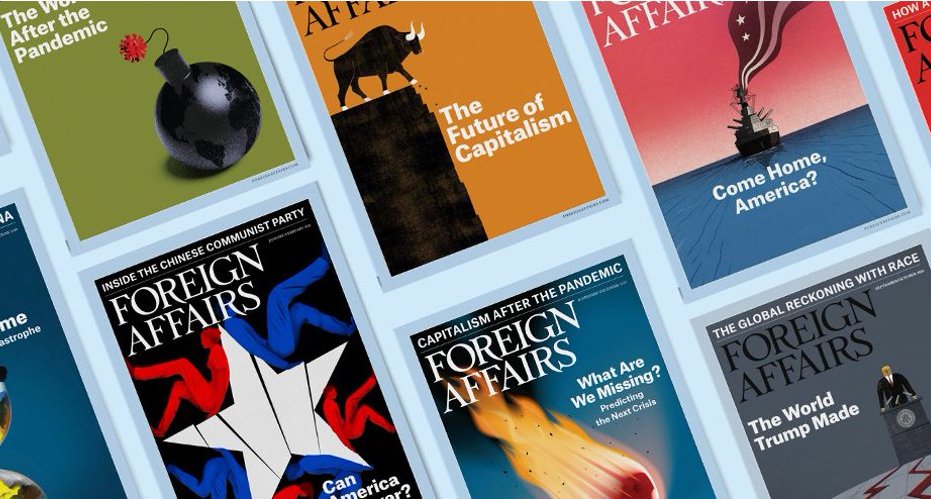
A Requisite for the Success of Popular Diplomacy
Elihu Root
As the public’s participation in democracy increases so will its participation in international relations, which the author refers to as popular diplomacy. To supplement (and potentially supplant) the closed-door conferences of the past, international disputes in democratic countries will increasingly be influenced by public opinion. The author contends that the dominant view in the US has foreign affairs being opaque and kept away from domestic politics. With this change comes a new civic responsibility to keep up with foreign dealings (to some extent) and to be vigilant and cautious of misinformation.
This article reads as contemporary and could in essence be rewritten today arguing that the latest technology better enables popular diplomacy and so forth. It’s little wonder that this article made the list of the best of Foreign Affairs from its first 100 years.
The Policy of France
André Tardieu
This article is an airing of grievances from the French following the aftermath of the 1919 Paris Peace Conference. The author casts France as misunderstood and victimized, frequently being painted as acting in bad faith but accepting concession after concession in post-war negotiations. After two wars fought on its soil within 50 years (the Franco-Prussian War and WWI), France desires a stable peace and reparations for the destruction caused by being turned into a battlefield once more.
Tardieu later became Prime Minister of France from 1929 to 1932.
The Tacna-Arica Controversy
Edwin M. Borchard
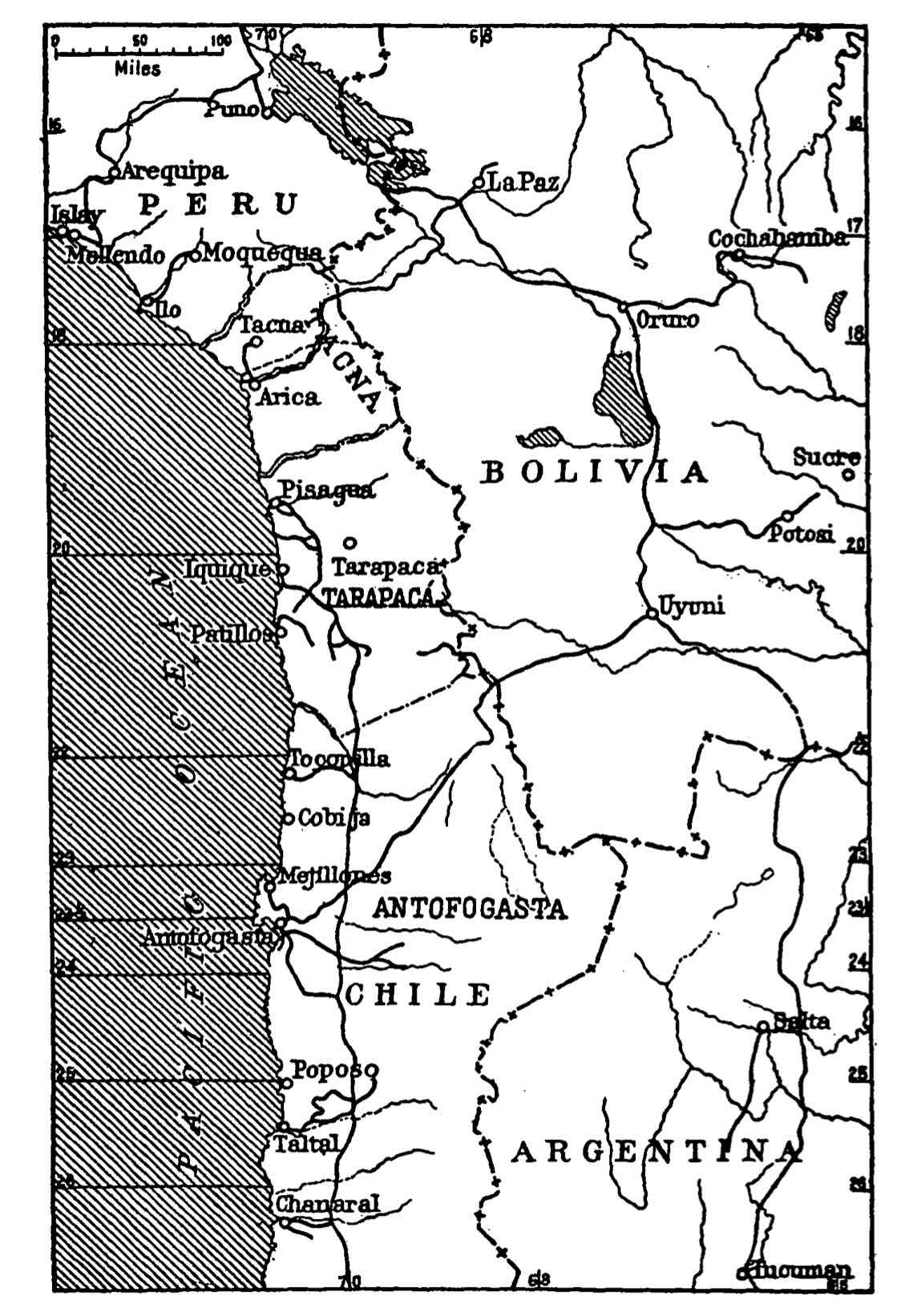
This is a detailed briefing on the War of the Pacific, a conflict between Chile and an allied Bolivia and Peru from 1879 to 1883 and its diplomatic aftermath. In the 1860s, Chile made territorial claims to Bolivian land extending its border northward to include a resource rich desert. After several treaties between Chile and Bolivia, a defensive agreement between Bolivia and Peru, and some bad faith negotiating, Chile initiated and easily won a war. Chile claimed land from both Bolivia and Peru - thereby landlocking Bolivia - and endless negotiating ensued. Even by the publication of this article, nearly 40 years later, the disputed territorial claims hadn’t been resolved and wouldn’t be resolved until an arbitration with the US in 1929.
This is a well-written, informative exposition of a (now) little-known dispute and even includes a helpful map (pictured to the right).
The Next American Contribution to Civilization
Charles W. Eliot
In opposition to neutrality arguments and the “America First” rhetoric of the early 1920s, this article argues that the US should engage in reconstructing Europe and supporting the burgeoning liberal world order even if it means being drawn into another conflict. The author contends that American prosperity is due to strong moral character rather than material wealth and that a policy of isolation would abandon that character.
The Little Entente
Eduard Beneš

During the Paris Peace Conference, new states were created from the territory comprising the Austro-Hungarian Empire (more on this in the next article). These young states immediately began balancing against Hungary and the possible resurgence of Habsburg rule. This short article chronicles these early diplomatic efforts to form the Little Entente, a defensive alliance between Czechoslovakia, Yugoslavia, and Romania.
Beneš was Foreign Minister of Czechoslovakia at the time of this article and later became President both before and after the Second World War.
Reconstruction in the Danube Countries
Josef Redlich
The author criticizes how the fallen Austria-Hungary dissolved into new states along majority ethnic lines. While this was done to dampen the possibility of future Habsburg rule, it did not consider the economic harms resulting from high integration and specialization in the former empire. Areas highly endowed with natural resources such as Czechoslovakia focused on mining and other more accessible areas such as Austria possessed merchant cities. The author praises the efforts of the Little Entente to organically form a union that would benefit all Central and Eastern European states but cautions that such an agreement is neither inevitable nor should be expected.
Ireland: Resurgent and Insurgent
Ernest Boyd
Written in the midst of the Irish Civil War, this article reports on the state of affairs in Ireland and argues in favor of the pro-treaty regulars. The author labels the opposition idealists that are willing to trade the economic welfare of the Irish people for the symbolism of not being under the British crown. Moreover, a third party at the table is the Belfast media who are both quick to report on skirmishes in the south and to cheer on chaos (even when it’s more imagined than actual).
This is clearly the most politically and emotionally charged article of the bunch and is especially interesting given the creation of Fianna Fáil and the ensuing shift in Irish politics in the latter half of the 1920s.
The Mandates of the Pacific
George H. Blakeslee
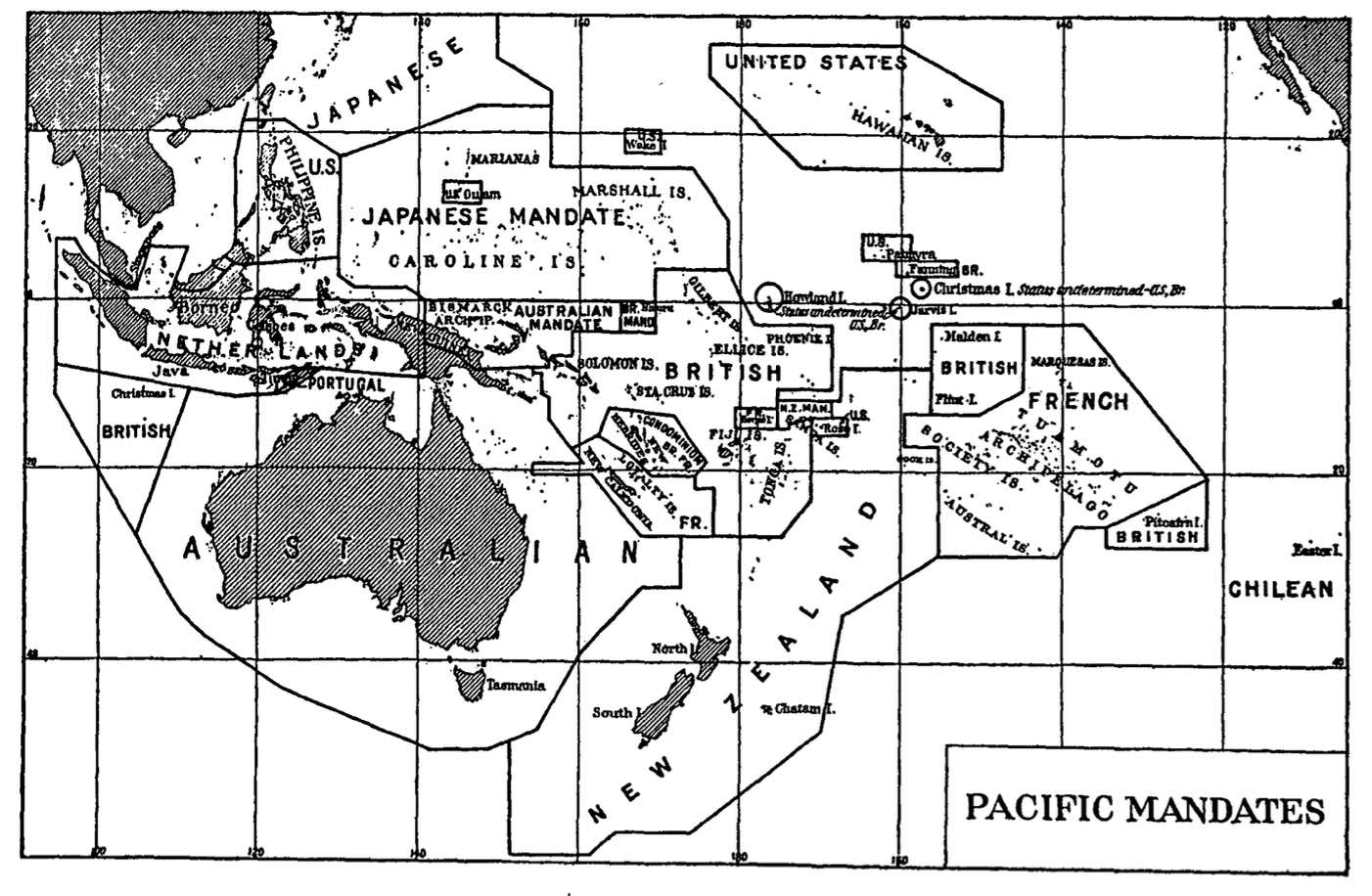
In the early 20th century, the German Empire amassed considerable colonial holdings in the Pacific. During the Peace Conferences, after the US failed to ratify the treaty, these islands were divided up among Japan, Great Britain, Australia, and New Zealand as a mandate system. This article evaluates each mandate largely as to how it affects the United States. For instance, one common theme is the holder states unsurprisingly monopolized the natural resources extracted from the held territories.
Blakeslee was a founder of the first journal of international relations (with a rather unfortunate title) which later was transmogrified into Foreign Affairs.
The Allied Debts
John Foster Dulles
In the First World War, the Allied effort was largely financed by the United States primarily through bond issues. This article reflects on the extent to which these debts should be expected to be repaid as well as the general problem of realizing returns on such investments. A naive view would be to expect a return in full; yet, it would be imprudent not to seek any repayment. The author analyzes the twin problems of debtor states obtaining enough foreign currency to make bond payments and the potential of crippling debtor economies in the medium term with high tax regimes funding repayment and concludes that a moderate amount of repayment ought to be sought.
While interesting both practically and philosophically, I find this analysis, especially with respect to obtaining foreign currency, to be dubious at best. Dulles was later Secretary of State under Eisenhower and is the namesake for Dulles Airport in Washington DC.
Russia After Genoa and the Hague
K (Archibald Cary Coolidge)
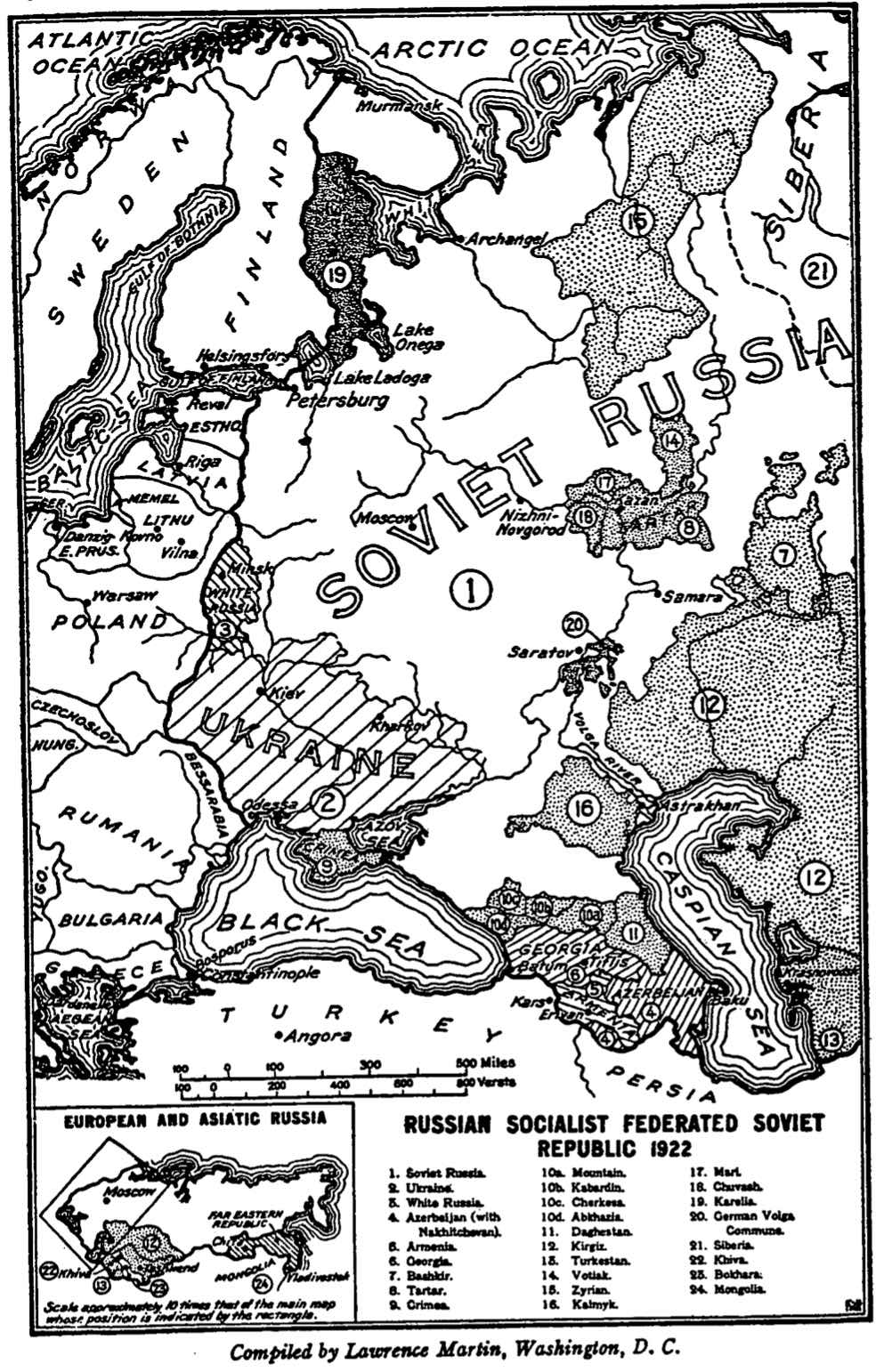
This article is an evenhanded assessment of Russia’s diplomatic relations which resembles a sort of messy love triangle. Since the conclusion of the war, the Soviet regime sought recognition from its peers, particularly the United States. Unfortunately, the U.S. adopted a non-interventionist stance toward European matters and opted not to participate in many conferences. Meanwhile, some European states are eager for Russian manufacturing exports to resume, others are weary of Soviet expansion into Central and Eastern Europe, and nearly all want the debt obligations of the prior Tsarist regime to be honored.
This article is pseudonymously written by Archibald Coolidge, the founding editor at Foreign Affairs.
Russia Today
Lawrence Martin
This is a single page brief accompanied by a map (displayed above) on the demographics of Soviet Russia based on a 1920 census. The author notes that these estimates may be outdated due to the significant migration resulting from widespread famine.
Further Economic Consequences of the Peace
J. A. M. de Sanchez
This is a review of America and the Balance Sheet of Europe by John F. Bass and Harold G. Moulton, Où va la France? Où va l’Europe? by Joseph Caillaux, and Peaceless Europe by Francesco S. Nitti. In general, the reviewer is critical of the authors’ bent in favor of economic analysis, a perspective the reviewer attributes to John Maynard Keynes’ influential The Economic Consequences of the Peace. In the reviewer’s words: “in their preoccupation with matters economic, [these authors] have lost sight of the very crux of the whole European problem, which is predominantly political.” Moreover, the reviewer finds fault with each of these books for finding ways to blame the French for the problems on the continent.
This article feels more in the style of the New York Review of Books than modern Foreign Affairs (which isn’t a bad thing). It’s witty, literary, and engaging yet critiques these books on their own terms.
 Buy me a coffee
Buy me a coffee
